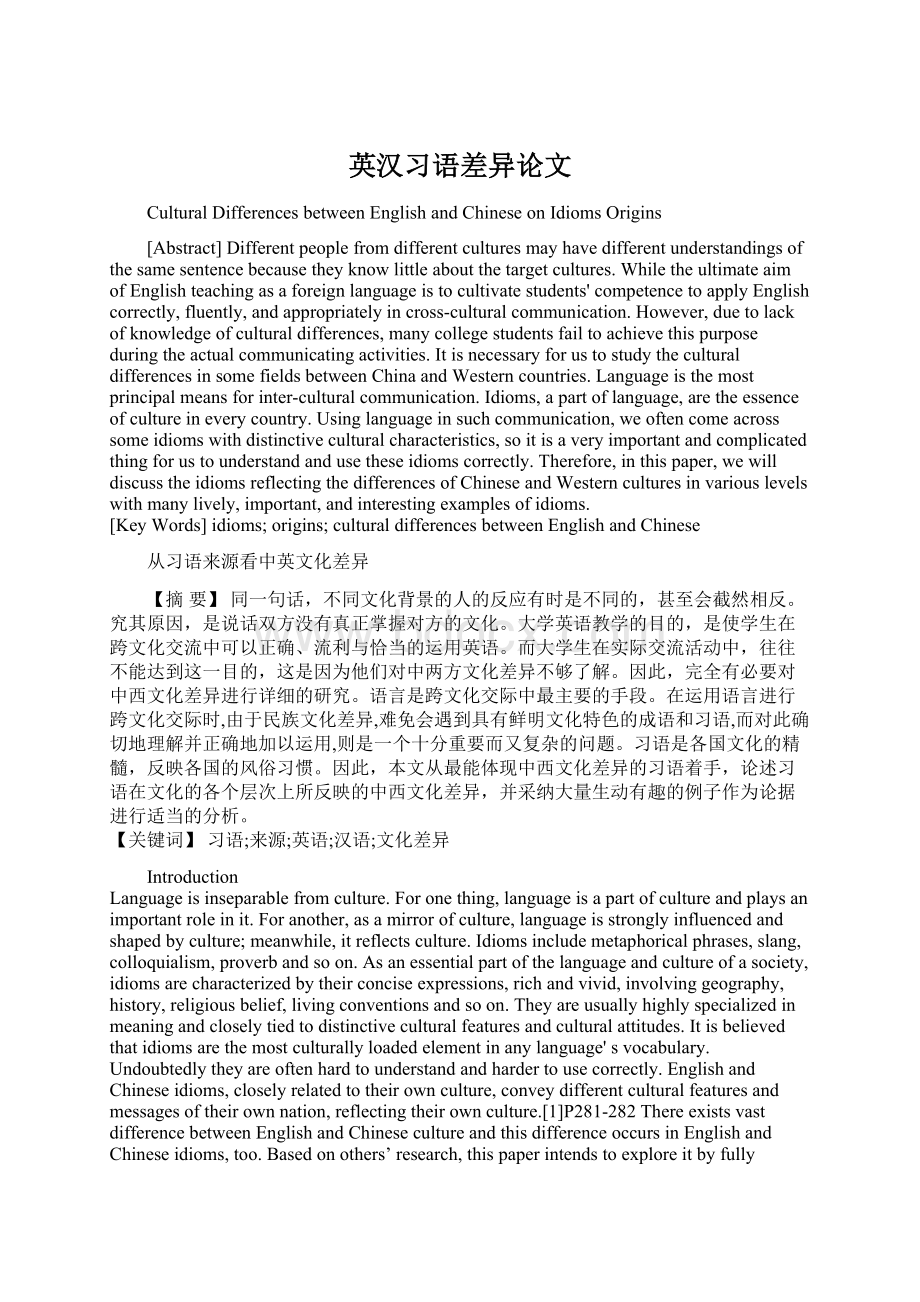英汉习语差异论文.docx
《英汉习语差异论文.docx》由会员分享,可在线阅读,更多相关《英汉习语差异论文.docx(8页珍藏版)》请在冰豆网上搜索。

英汉习语差异论文
CulturalDifferencesbetweenEnglishandChineseonIdiomsOrigins
[Abstract]Differentpeoplefromdifferentculturesmayhavedifferentunderstandingsofthesamesentencebecausetheyknowlittleaboutthetargetcultures.WhiletheultimateaimofEnglishteachingasaforeignlanguageistocultivatestudents'competencetoapplyEnglishcorrectly,fluently,andappropriatelyincross-culturalcommunication.However,duetolackofknowledgeofculturaldifferences,manycollegestudentsfailtoachievethispurposeduringtheactualcommunicatingactivities.ItisnecessaryforustostudytheculturaldifferencesinsomefieldsbetweenChinaandWesterncountries.Languageisthemostprincipalmeansforinter-culturalcommunication.Idioms,apartoflanguage,aretheessenceofcultureineverycountry.Usinglanguageinsuchcommunication,weoftencomeacrosssomeidiomswithdistinctiveculturalcharacteristics,soitisaveryimportantandcomplicatedthingforustounderstandandusetheseidiomscorrectly.Therefore,inthispaper,wewilldiscusstheidiomsreflectingthedifferencesofChineseandWesternculturesinvariouslevelswithmanylively,important,andinterestingexamplesofidioms.
[KeyWords]idioms;origins;culturaldifferencesbetweenEnglishandChinese
从习语来源看中英文化差异
【摘要】同一句话,不同文化背景的人的反应有时是不同的,甚至会截然相反。
究其原因,是说话双方没有真正掌握对方的文化。
大学英语教学的目的,是使学生在跨文化交流中可以正确、流利与恰当的运用英语。
而大学生在实际交流活动中,往往不能达到这一目的,这是因为他们对中两方文化差异不够了解。
因此,完全有必要对中西文化差异进行详细的研究。
语言是跨文化交际中最主要的手段。
在运用语言进行跨文化交际时,由于民族文化差异,难免会遇到具有鲜明文化特色的成语和习语,而对此确切地理解并正确地加以运用,则是一个十分重要而又复杂的问题。
习语是各国文化的精髓,反映各国的风俗习惯。
因此,本文从最能体现中西文化差异的习语着手,论述习语在文化的各个层次上所反映的中西文化差异,并采纳大量生动有趣的例子作为论据进行适当的分析。
【关键词】习语;来源;英语;汉语;文化差异
Introduction
Languageisinseparablefromculture.Foronething,languageisapartofcultureandplaysanimportantroleinit.Foranother,asamirrorofculture,languageisstronglyinfluencedandshapedbyculture;meanwhile,itreflectsculture.Idiomsincludemetaphoricalphrases,slang,colloquialism,proverbandsoon.Asanessentialpartofthelanguageandcultureofasociety,idiomsarecharacterizedbytheirconciseexpressions,richandvivid,involvinggeography,history,religiousbelief,livingconventionsandsoon.Theyareusuallyhighlyspecializedinmeaningandcloselytiedtodistinctiveculturalfeaturesandculturalattitudes.Itisbelievedthatidiomsarethemostculturallyloadedelementinanylanguage'svocabulary.Undoubtedlytheyareoftenhardtounderstandandhardertousecorrectly.EnglishandChineseidioms,closelyrelatedtotheirownculture,conveydifferentculturalfeaturesandmessagesoftheirownnation,reflectingtheirownculture.[1]P281-282ThereexistsvastdifferencebetweenEnglishandChinesecultureandthisdifferenceoccursinEnglishandChineseidioms,too.Basedonothers’research,thispaperintendstoexploreitbyfullyanalyzingthemainculturalreasonscausingidiomaticexpressionsdifferencesinbothChineseandEnglish.
1.Differentlivingcircumstance
Thatcultureisdeterminedbygeographicalenvironmentisasubjectiveviewofgeographicaldeterminism.Itcannotbedenied;however,thatnaturalenvironmentincludinggeographicalposition,climate,andecologicalconditionissomethingthatplayscontributoryroleintheformationofaculture.Peopledwellinginacertainregiontrytoadaptthemselvestothesurroundingssothatlivelihoodcanbemaintained. Asaresult,theirspecialwayofliving,thinkingandbehavingisformedasaside-productoftheirrelationshipwiththeenvironment.
1.1.Geographicalenvironment
Britainisanislandcountry.Peoplewholivealongseacoastandwhoselivelihoodisdependentontheseawillhaveidiomsaboutwater,sailing,islandandfish.Forexample,wespeakinChinese挥金如土,butweshouldrenderitintoEnglishas"spendmoneylikewater".TherearealotofEnglishidiomsaboutship,waterandfish:
"ascloseasanoyster"(守口如瓶),"castananchortowindward"(未雨绸缪),"atsea"(茫然),"tokeepone'sheadabovewater"(奋力图存),"totakethewindoutofsomebody'ssail"(先发制人),"towerone'ssail"(甘拜下风),"infullsail"(全力以赴),"sailunderfalsecolors"(欺世盗名),"halfseaover"(酒喝得太多),"fishbeginstostinkatthehead"(上梁不正下梁歪),"neveroffertoteachfishtoswim"(不要班门弄斧),"dullfish"(枯燥无味的人);"plainsailing"(一帆风顺),"totrimone'ssailtothewind"(见风使舵),"tobeinthesameboat"(同舟共济),"toburnone'sboat"(破釜沉舟),"abigfishinalittlepond"(山中无老虎,猴子称霸王).[2]P110
Ontheotherhand,theHanPeopleliveonland,theybelongtoanagrariansocietythatplacesagriculturalproductionatthetopofthenationalagenda,regardingindustryandcommerceasthenon-essentials.Duringthelonghistoryoffarming,theChineselanguagehasaccumulatedlargenumbersoffarmers'idioms,like二人同心,黄土变金(Whentwopeopleareofthesamemind,evenclaymaybechangedintogold),上无片瓦,下无寸土(aspoorasachurchmouse),人不亏地,地不亏人(Themaster'sfootstepsfattenthesoil),瓜熟蒂落(Thingswillbeeasilysettledwhenconditionsareripe),瑞雪兆丰年(atimelysnowpromisesagoodharvest),五谷丰登(abundantharvestofallfoodcrops),种瓜得瓜,种豆得豆(asamansows,soshallhereap),四体不勤,五谷不分(canneitherdophysicalworknordistinguishricefromwheat).[3]P99
1.2.Climate
Climateisanotherfactorinthelivingcondition.WhileBritainislocatedinwesternhemisphere,withNorthTemperateZoneandmarineclimate,so "westwind"isthesymbolofspring.ThefamousEnglishpoetShirley's"OdetoWestWind"isapraisingsongofspring. SummerinBritainisawarmandcomfortableseason,whichisusuallylinkedwith"lovely", "gentle"and "nice".Shakespearecompareslovertoasummerinoneofhispoems, "shallIcomparetheetoasummer'sday?
Thouartmorelovelyandmoretemperate."[4](Shakespeare’sSonnet18)ThewestwindblowsfromtheAtlanticOceanaswarmandgentleasChineseeastwindandbringsvoluminousraintothisarea.SothatBritainaboundsinraincanbeprovedinsomeidiomsconcerningrain:
"tomakehaywhilethesunshines"(趁热打铁),"rainyday"(穷困时期),"torainorshine"(无论如何),"toraincatsanddogs"(倾盆大雨),"asrightasrain"(非常正确),etc.Britainusedtobeknownasacountryoffogpartlyduetothedampnessandwarmnessoftheweatherconditionandpartlytotheairpollutionassideproductoftheindustrialrevolution.Therefore,inEnglishtherearesomeidiomaticexpressionsconcerningfog,suchas"inafog"(云里雾里),and"tohavenotthefoggiestidea"."Springuplikemushrooms"(雨后春笋)maybecomeincomprehensibletoChineselearnerifheisunawarethatthisidiomimpliestherichnessofmushroomgrowinginthewetareainBritainjustas"bamboo"inChinesespecialty,and"asplentifulasblackberries"(黑莓遍地)alsoindicatestheecologicalenvironmentinBritain,forblackberriesareeasilyavailableinEngland.
InChineseculture,"eastwind"is"thewindofspring";springiswarmandcolorful,anditisregardedasthebeginningofalllives.TherearemanyidiomsinChina,whichrefertospring:
春暖花开(inwarmspring,alltheblossomsareinfullbloom.),春意盎然(springisverymuchintheair),一年之计在于春(thewholeyear’sworkconsistsinagoodstartinspring),万紫千红总是春(itisspringwhenthegayestcoloursabound).Springhastheimageofgoodthings,soChinese“春”isusedinsomeidiomstoexpressthis:
满面春风(one’sfaceradiateshappiness),春风化雨(thelife-givingspringbreezeandrain---salutaryinfluenceofeducation).Summerisalwaysconnectedwithextremelyhotortheintenseheat,so赤日炎炎似火烧(theblazingsunscorcheslikefire)、骄阳似火(theburningsunislikeafire)aretermsoftenusedtodescribesummer.
Sodifferentlivingsurroundingsmayproducedifferentidiomsanddifferentculture.
2.Differenthistoricalallusion
Differentcountriespossessdifferenthistoryculture,whichmainlycomprisesallusion,myths,poems,ancientbooksandrecords,etc.Amongthem,allusionisthemostimportant;itreflectsthenationalcharacteristic.Idiomsfromhistoryculturearethegemsofhumanculturalheritage.Itisworthwhileforustolearnthemwell.Therearelotsofidiomscomingfromthehistoricalallusion.Thestructuresoftheseidiomsareverysimplebuttheyhaveprofoundmeaning,sowecannottranslateandunderstandtheseidiomsfromtheliteralmeaning.ThedifferenthistoricalbackgroundsoftheEnglishandChinesepeoplehavetheirdifferentlegendsandanecdotesabouthistoricalfigureswhichhaveprovidedrichandvariedmaterialsfortheiridioms,andconsequentlygiveanationalcolortotheidiomsinthetwolanguages.ItisnecessaryforustolearnandunderstandtheEnglishallusionaswellastheChineseallusion.Itcanenlargeourscopeofknowledge,widenourfieldofvisionanditisusefultolearnabouttheoriginanddevelopmentofEnglishandChineselanguageandliterature.
2.1.Historicalevents
Inmost,ifnotall,languages,peopleembellishtheirspeechorwritingwithreferencestocharactersoreventsfromtheirhistory,thatistosay,idiomaticexpressionsarecloselyrelatedtoacountry'shistory.Taketheaspectoflanguageforexample:
therearealotofidiomsintheChineselanguagewhichcannotfindanequivalentintheEnglishlanguagebecausethehistoryofthetwocountriesarequitedifferent.ManyChineseidiomsarefromtheirownhistoricaleventswhicharewell-knownbyChinesepeople.Forinstance,thefollowingidiomsarefromhistoricaleventsinAncientChina:
风声鹤唳,草木皆兵(beinanextremelynervousstateinwhichoneisfrightenedbytheslightestsound)isfromthedefeatofFuJian’s(苻坚)armyatFeishuiRiverduringtheEastJinDynasty;卧薪尝胆(tosleeponbrushwoodandtastegall---toundergoself-imposedhardshipssoastostrengthenone'sresolvetowipeoutanationalhumiliation)comesfromTheHistoricalRecords•Yue’sStateEmperorGouJian’sNobleFamily(《史记·越王勾践